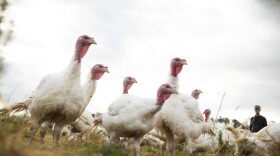
Emma Peaslee
Emma Peaslee is a 2020-21 Kroc Fellow. Before coming to NPR, she reported for Atlanta's member station, WABE. She covered public forums about toxic chemicals leaking into neighborhoods, the world's largest 10K race, and the federal government's plan to resume executions. Peaslee has a master's degree in journalism from the University of North Carolina at Chapel Hill where her work received the 2020 Edward R. Murrow Award for best student newscast. She is a Minnesota native.
-
Sending money from one bank to another just down the street can take longer than sending a package across the country. The Federal Reserve is trying to change that with a faster way to send money.
-
Whenever you register for a website or install an app, you're often entering into a legally enforceable contract. NPR's Planet Money explores how a court case changed contracts forever.
-
Edward Tian, 22, used his winter break to create an app that helps teachers detect AI-generated essays. It comes at a time when schools are growing more concerned about the use of this technology.
-
A college kid's mission to prevent misuse of artificial intelligence.
-
The Washington Spirit, D.C.'s national women's soccer team, just sold for a record amount after a months-long ownership battle. It's a story of how sports teams are not a typical business investment.
-
Several schools have cut women's sports teams during the pandemic, and some of the teams have lawyered up in response. Ultimately, these lawsuits ask the question: how do we measure equality?
-
Urban living, concern for the environment and a lack of romanticism about cars are some of the reasons why so many of them and their younger counterparts in Gen Z care about busses and subways.
-
Ever since Loeffler denounced WNBA support for Black Lives Matter, players have wanted the league to force her to sell the team.
-
In the midst of a pandemic that's wreaking havoc on prisons and disproportionately affects older people, activists known as the Kings Bay Plowshares have been sentenced to up to 33 months in prison.
-
As families across the U.S. scale back on how they traditionally celebrate the holiday, it's been a challenge for turkey producers as they figure out how to adapt to the changing market.





